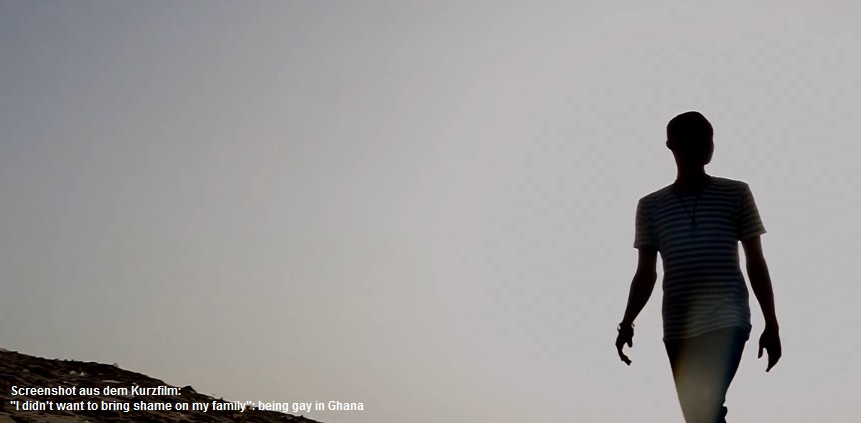In the first part of the report Kojobesia talked about his youth as a gay man in Ghana. He also had experiences with sex work there. This is how Kojobesia came to human rights work.
In 2003, an ex-boyfriend asked him for help. He worked as an aid worker and had an appointment with USAID. The US agency supports information campaigns on HIV, among other things. "They're looking for someone who knows a lot of gay men - you have to go there," the friend asked. Shortly afterwards, Kojobesia, who is just 20 years old, was the only man sitting in a group of sex workers. "We accused each other of snatching customers away from each other," says Kojobesia, laughing out loud. But his performance was convincing. Kojobesia became a peer educator, travelling from estate to estate, talking to gay acquaintances and talking to them about safer sex. His working materials: pictures, condoms and a wooden dildo. "We often just sat together in groups of three or four under a tree," he recalls, "with our backs to the neighbours so that we could talk in peace." The arduous work at the gay grassroots level was also the starting point for the first AIDS service organisation for gay men in Ghana: Brother's Keeper.
Prevention work quickly reached its economic limits. "The most common question people asked was: How do we get condoms and personal lubricants?" recalls Kojobesia. These are a luxury item in Ghana. The country is booming and is regarded as a model African democracy. The average earner earns two euros a day. Together with UN organisations, Brother's Keeper therefore organised contact points in clinics. There, gay men receive free condoms - and respectful counselling. No easy task in deeply religious Ghana. In a survey conducted in 2013, 98 per cent of Ghanaians surveyed declared homosexuality to be unacceptable, the highest figure among 40 countries. "We are seen as double sinners," says Kojobesia. "Being gay is not only forbidden by law, but also by the Bible." When Kojobesia was once hospitalised for a gonorrhoea infection, the nurse picked up the Bible after the diagnosis and criticised his sins. "I had to tell her: I'm here for treatment, not for conversion!"
In the meantime, the Ghanaian government is also endeavouring to better reach gay men who are particularly affected by HIV and to sensitise medical staff. The Global Fund is supporting this process. Once again, Kojobesia was one of the first to be involved as an expert in gay sex. Initially, he only informed the doctors and nurses in the start-up clinics, later in the large hospitals that specialise in HIV. "It was a great job," says Kojobesia, "but this work made me realise: my people are perishing for lack of knowledge!" The devout Christian quotes the Bible to describe the difficult situation of gay-positive people. "If people don't confidently insist on treatment, they are sent home without a follow-up appointment after an HIV diagnosis," says Kojobesia. In 2014 alone, eight of his acquaintances died of AIDS. "It wasn't HIV that killed these men," emphasises Kojobesia, "it was the stigma that killed them. They don't get enough support because they are gay."
Kojobesia has found his mission in life: To bring justice to gay men, step by step. He started where it is most urgent: in the healthcare system. He continues to pursue this task from afar. He currently lives in Hamburg and is training to become a freight forwarding agent. With a certificate from Germany, he wants to return to Ghana in a few years. His dream: a community centre where gays, lesbians and trans people can recharge their batteries. "You have to be strong in Ghana," says Kojobesia, "otherwise they butter you up. If someone attacks you, look around you, look for allies - or grab something to defend yourself." In times of need, a gay man sometimes has to cast the first stone.
*Name changed by the editors. In Ghanaian colloquial language, "Kojobesia" is the name given to a man who - in the eyes of the majority society - does not appear particularly masculine.










